From July 29 to September 6, Eleazar Castellanos, a 46-year-old undocumented day laborer with Tucson’s Southside Worker Center, traveled with the Undocubus movement from Phoenix, Arizona to Charlotte, North Carolina. Armed with the cry “No Papers, No Fear,” the 40 plus riders carried their message of “dignity and justice for all” to the delegates of the Democratic National Convention. They demanded an immediate halt to the massive deportations, (now totaling over 1 million during the Obama administration) and to the ongoing criminalization of their communities.
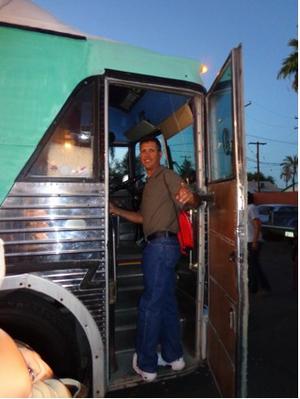
Standing with Eleazar an his wife Rosy in their Tucson living room, the family pictures lining the fireplace mantel document the sixteen years that have passed since they traveled together from Nogales, Sonora. As we sit at the kitchen table to recount his journey, time, in its myriad senses, becomes a recurrent theme throughout the conversation.
There was the time when the entire Undocubus detoured to Hoover, Alabama and stood in solidarity with local workers as they advocated for better living and working conditions and an end to local police harassment. Eleazar addressed the seventy plus jornaleros, or day laborers, who had taken to the streets. The police presence was so strong says Eleazar, that “all that was missing was the SWAT team.”
Later Eleazar recounts how a “young, white woman” approached the group in Greensboro, North Carolina. “She said that the movement—we were the last hope that her husband wouldn’t be deported. He was in detention. I will never forget as she asked, ‘Please, do something.' I felt really incompetent. It was traumatic. I gave her a hug; told her that we were with her. It wasn’t anything big, but I felt obligated to give her some words of hope.”

Returning to Alabama, he expresses the pride he felt, watching his fellow riders defiantly stand and interrupt the presentation to the United States Commission on Civil Rights by Kris Kobach—Kansas Secretary of State and drafter of racist, anti-migratory legislation such as Arizona's SB1070. Eleazar’s memories carry us between the ten states and fifteen-plus cities visited by the Undocubus. There were meetings with the Freedom Riders of the 1960’s Civil Rights Movement, community reunions, briefs, non-violence workshops, marches, acts of civil disobedience, and press conferences.
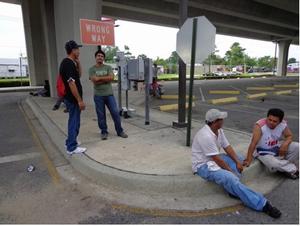
Our conversation arrives in Charlotte, North Carolina, the final destination for the group and the site of the culminating act of civil disobedience. At the start of the trip, all undocumented riders had received a risk designation: low, medium, high. Because Eleazar has a deportation record, he had been assigned to the high-risk group. “In Tucson, when I (realized) I was all alone among those who had volunteered to go on the trip….I was really afraid. I was really afraid about what could happen to me,” he admitted. But arriving in Charlotte he felt ready. Behind closed doors the group labored all night. “We were mentally prepared,” says Eleazar, “We knew we would be going to ICE (Immigrations and Custom Enforcement); that was a mute point. But I was carrying all the experiences of the people we had met along the way. We were bringing those stories to the President, to the public.”
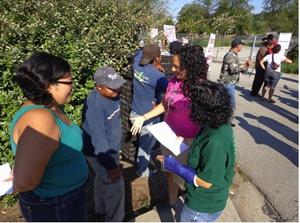
On September 4, the “Riders for Justice” disembarked the bus and started marching to the designated uptown intersection. The group passed police barricades and checkpoints, surrounded by supports and a fleet of press. By now, the attention of the national and international media had focused its lens on the Undocubus and their demands. Asked if he was nervous, Eleazar says instead the feeling was electric. He explains, “There were so many people, so much press. We were really excited, full of adrenaline, and so focused on what we had to do. We had to get to the intersection. We were there to be listened to and so we were going to do everything possible to be heard.”
Eleazar recounts the moment, “We were yelling for 30 minutes, and the rest of the group formed a security circle around us. But as time passed many memories of family, of my compañeros came to me. It was a lot of time and I began to think, ‘Maybe I shouldn’t be doing this. This is really risky.’ I was thinking and the tears started flowing. And when the rain came, I was relieved. But then I looked at my compañeros, and I started shouting more loudly. We were soaked.”
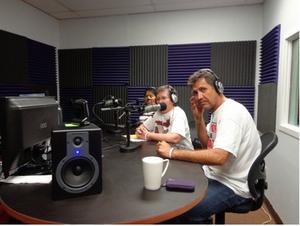
Eleazar and nine other riders were arrested and chained together in soaking wet clothes and spent twelve sleepless hours in detention. While detained, ICE officials constantly pressured Eleazar to provide information about his country of origin, where along the U.S.-Mexico border he had crossed, and additional personal information. He refused. Reading their shirts, a plain clothed official with his hand strategically covering the badge on his belt, approached the group. “No fear?,” he said “Of course you’re afraid”.
All ten Undocubus riders were released the next day. Eleazar noted that, “We had a group of lawyers, but it wasn’t so much because of them; it was the community, the ability to engage and mobilize the community. People were calling in from all over. So it’s thanks to the community that all the networks were activated.”
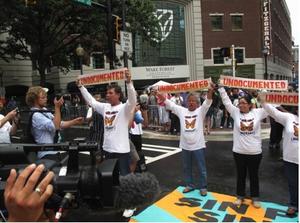
Upon their release Eleazar and his compañeros were invited to meet with DNC delegates. He recounts, “They asked the reason we did this disobedencia, and we said, ‘We are coming out of the shadows. You have to treat us with dignity, like human beings.’ Our question for Obama is what side of history do you want to be on? Do you want to be known as the president who deported more migrants than any other in history? Or do you want to be remembered as the first African-American president who helped the migrant population? We asked them to stop the deportations, stop the separation of families, to stop 287g, to stop the raids. They told us to go back to the communities and to vote. That only with voting can we get ahead. That’s all they said. That’s when I got angry. ‘That’s great,’ I said, ‘The elections are months away, and the president has had years and he hasn’t done anything. We need them to do something first. Stop the persecution, NOW’. They didn’t say anything.”
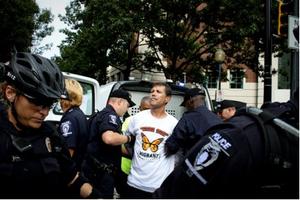
***
Over a month has passed since Eleazar’s return to Tucson, and time marches on. While Eleazar was away, two close compañeros from the Southside Worker Center were detained, along with their wives. Of the four, three have been deported and one worker remains locked up as he fights his case. SB1070’s “show me your papers” provision has been put in effect, “legalizing the racial profiling we know was already happening,” says Eleazar.
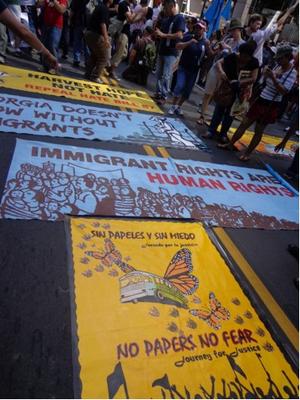
We reflect upon his reintegration and the new challenges facing community members. Eleazar states, “You have aspirations, you worry about the future generations. The only way to advance is to get involved. We need actions done by those who are affected. What happens if we unite, and lift our voices? Imagine how strong we’d be. We need to connect, to motivate through our testimonies. We also need to educate. We are missing an awareness campaign directed toward white, American people, because they’re misunderstanding the situation.”
And what is he feeling being back home? He believes, “Here in Tucson the feeling is like they are attacking us, like we’re running out of time.” The tone of our conversation takes on a new sense of urgency, one that is not echoed in national politics. Says Eleazar, “It doesn’t matter where you go, the anti-migratory laws will reach you wherever you go within this country. You can’t hide. If you leave the shadows, you’ll be able to organize with lots of other people….. because inside your community you’re going to find faith, you’re going to find hope.” “It requires sacrifice. It requires humanity. It requires vocation...this is a revolution.”
Patricia Hohl is an activist and community organizer in Tucson, AZ and is pursuing her MA at the Center for Latin American Studies at the University of Arizona. Her research interests include migration, deportation, and border militarization. She currently works with a number of local grassroots organizations including the Southside Worker's Center.

